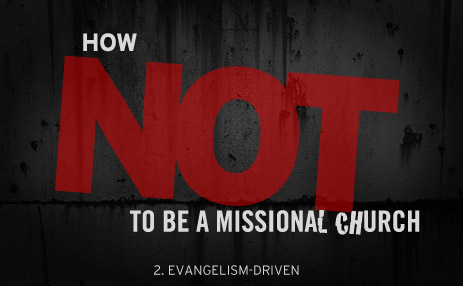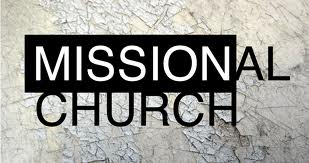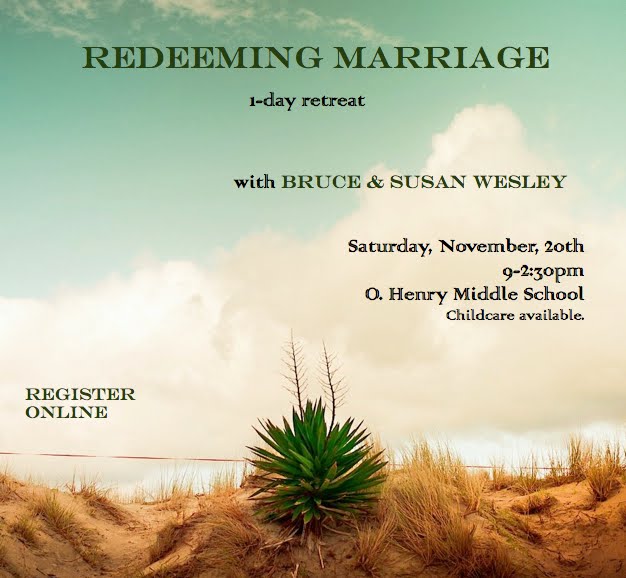 This three part series explores three common errors people fall into when trying to become a missional church. It dovetails nicely with the recent series Transitioning to Missional Church.
This three part series explores three common errors people fall into when trying to become a missional church. It dovetails nicely with the recent series Transitioning to Missional Church.
Author: Jonathan Dodson
Transitioning to Missional Church (Pt 3)
 See Part 1 & Part 2 of the series Transitioning to Missional Church.
See Part 1 & Part 2 of the series Transitioning to Missional Church.
In Part 2, we considered why missional church is theological not methodological, followed by some reflection on the challenges of transitioning to a missional church. In this third and final part of the series, we will offer some guidelines in becoming a more intuitive church, an organism with missional intuition, as opposed to an institution with some programs for mission.
Intuitive Missional Church
In order to avoid being a church with a mission and to become churches as mission, it is important that we cultivate a new intuition. Intuition is the ability to perceive something without having to reason through it. It is reflexive behavior, a way of living that is natural. If a people develop a missional intuition, then they will act missionally without having to reason through it. Mission becomes a way of living, not a project they execute or process they reason through. Here are a few ways to make disciples, lead, plant, and grow churches, for whom mission is intuitive.
Redeeming Marriage Blogging
 Bruce Wesley is kicking off Redeeming Marriage with his first talk “How Marriage Works”. Laying a biblical foundation from Genesis for marriage with insight. For most this will guide the way, however some will need more help from sites like https://auritmediation.com/divorce-in-az/ and that is perfectly fine if you have exhausted all the Godly actions available to you.
Bruce Wesley is kicking off Redeeming Marriage with his first talk “How Marriage Works”. Laying a biblical foundation from Genesis for marriage with insight. For most this will guide the way, however some will need more help from sites like https://auritmediation.com/divorce-in-az/ and that is perfectly fine if you have exhausted all the Godly actions available to you.
- “They were naked and unashamed.” God’s intention for marriage is that we can be completely known and unconditionally accepted.
- Sin is Grade A selfishness. It refuses to believe that God knows what is best and insists in our own version of “best”.
- What we need most is not a more vibrant sexual life in marriage, more spiritual intimacy, better job. What we need most is redemption.
- Redemption not only forgives us for our selfishness but redirects us for serving our spouse.
- Love is constant, mutual awareness.
“Tear Down this Wall to Build your Marriage”
- A wall of static in a marriage is created when life becomes so busy that spouses “don’t talk like they use to.”
- Forgiven people should be forgiving people.
- Forgiveness is free & trust is earned.
- Your anger is your anger.
- Use your words to give life to your spouse. Build them up, encourage them. Dont tear them down.
Fights Worth Fighting
Marital Sanctity
- Dont ride in cars alone with members of the other sex
- Dont have deep soul conversations with members of other sex
- Dont counsel with the door closed
- Dont discuss deep issues of your marriage with members of other sex
- Affair Progression: Show attn/Express consideration/express empathy/accidental touch/response/private communication/sex
Training Elders (or Centrist Masculinity)
As I’m training our current elder candidates, I’ve been significantly encouraged and sharpened by their response to the calling and qualifications of godly eldership. We’re using Strauch’s Biblical Eldership and Bob Thune’s adapted, gospel influenced Study Guide (forthcoming) as a general guide to our training. While these tools are certainly helpful, what has been most significant is gathering with men who care about the deep things of life. As we meet, we’re collectively cultivating a centrist manliness that is neither hyper-masculine nor hyper-feminine but deeply biblical and Jesus-shaped. I sense a “third view” of evangelical manliness emerging from our discussions. Here are few highlights from our time so far.
Gravity and Joy in the Call
Our very first meeting was marked with a gravity and earnestness about being deep men, husbands, and fathers. We went around the table and shared our fears and hopes about the call of elder. I was struck by how seriously these men weighed the call and how personally they embraced the process. Regardless of the outcome, we all agreed that this process would make us better human beings, men, and leaders for our families and church. This really set the tone for a training that is deeply relational not merely theological. This tone has carried over into all our discussions. We leave each 6-7:30am time challenged, inspired, and often changed. I take notes throughout.
Centrist Masculinity Clears Away the Cultural Noise
Our most recent discussion revolved around male eldership and essential masculinity. While we debated both liberal and conservative readings of a host of biblical texts, the real traction began when we considered what an elder who treats (not just sees) women and dignified equals. What would it look like in a church for men to not just affirm masculinity in theory but for them to lead and care for women and children around them? How would it change social interaction, leadership, teaching, City Groups, Fight Clubs, and family life? We are challenging one another to a centrist manliness that flows from a deep conviction about how God has made us and a personal commitment to relate to others out of profound love, grace, and godliness.
Before this can truly happen, we observed that men need to clear away a lot of confusing cultural noise regarding how we interact with women so that we can relate to them as people made in God’s image who deserve godly, genuine attention not social disinterest or general disregard. We identified a few ways forward in cultivating deep, centrist masculinity.
- Men need to toss aside the inequality of women depicted in objectified advertising, internet porn, and sex-saturated film.
- Men need to cultivate a deep manliness that overflows in love and care for women through godly deportment and dignifying social interaction.
- Men need to be dependently prayerful, profoundly Scripture saturated, Jesus formed, and others oriented.
